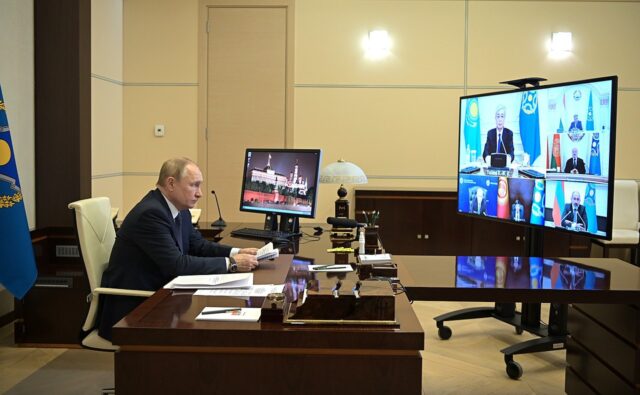
Geopolitical Report ISSN 2785-2598 Volume 30 Issue 2
Author: Silvia Boltuc
In the last months, the South Caucasus has again experienced regional turbulence. While there have been protests in Georgia over a controversial draft law that would have required some organisations receiving foreign funding to register as “foreign agents”, Armenia and Azerbaijan might be again on the edge of an escalation involving the CSTO and, therefore, Russia.
On March 25th, 2023, Azerbaijan violated the terms of the 9th November 2020 agreement, entering the demarcation line in the Shusha region and taking under the control of the Azerbaijani Army several high grounds between Jaghazur and Zabukh villages, as well as a large area along the border. Given the concern of losing Turkey’s support in the case of Recep Tayyip Erdogan’s defeat at the upcoming presidential elections in May 2023, Azerbaijan might evaluate conducting an attack towards Armenia shortly.
On March 31st, 2023, Yury Shuvalov, the Collective Security Treaty Organisation (CSTO) Secretariat spokesperson, stated that CSTO is ready to send a mission to the Armenian-Azerbaijani border to ensure Armenia’s security. On April 5th, 2023, the official representative of the Russian Ministry of Foreign Affairs, Maria Zakharova, stated that the Russian side is satisfied that Armenia remains interested in accepting CSTO peacekeepers.
Geopolitical Scenario
Nagorno-Karabakh/Artsakh has a long history of conflict, with ethnic Armenians living in the area demanding the transfer of the Nagorno-Karabakh Autonomous Oblast from Soviet Azerbaijan to Armenia in 1988. The conflict escalated as the Soviet Union collapsed. Ethnic Armenians mainly inhabit the region and fear living under Azerbaijan’s control might lead to ethnic cleansing.
On November 9th, 2020, Armenia, Azerbaijan, and Russia signed a truce to end all hostilities in the Nagorno-Karabakh region. President of Azerbaijan, Ilham Aliyev, the Prime Minister of Armenia, Nikol Pashinyan, and the President of Russia, Vladimir Putin, signed the ceasefire. Brokered by Russia, the agreement resulted in some 2,000 Russian peacekeepers being deployed.
On September 13th, 2022, the Armenian Defense Ministry announced that Azerbaijani troops fired on the border settlements in the country’s southeast (Sotk, Goris and Jermuk). Armenia requested a special CSTO Permanent Council session to discuss the Azerbaijani military aggression. CSTO spokesman, Vladimir Zainetdinov, stated that the organisation is against using force on the Armenian-Azerbaijani borders. He stressed that CSTO considers only political and diplomatic methods to resolve contradictions between Baku and Yerevan, as happened on November 9th, 2020, when under Russian supervision, the Azerbaijani President and the Armenian Prime Minister signed the ceasefire which ended the 2020 Nagorno-Karabakh Conflict.
Armenia has expressed dissatisfaction with CSTO. Speaking at a CSTO summit in Yerevan on November 23rd, 2022, Pashinyan said it was depressing that Armenia’s membership in the CSTO has failed to contain Azerbaijani aggression.
He furthermore stressed that this hugely damaged the CSTO’s image both in Armenia and abroad. Moreover, Pashinian said his country had supported CSTO member Kazakhstan immediately in early January when Kazakh President Qasym-Zhomart Toqaev asked CSTO troops to enter his country following unprecedented antigovernment protests.
On January 19th, 2023, a European Parliament resolution condemned the inaction of the Russian peacekeepers, believing that their replacement by the international peacekeeping forces of the OSCE should be urgently negotiated.
In December 2022, Azerbaijan isolated Armenians living in Artsakh/Nagorno-Karabakh, closing the only linkage between the disputed territories and Armenia. The international community and the Yerevan government blamed Russian peacekeepers for not intervening to remove the blockade.
On April 4th, 2023, Azerbaijan violated an agreement reached with Russian peacekeepers and barred a group of Nagorno-Karabakh Armenians, including children, from returning home after being stranded in Armenia due to the blockade of the Lachin Corridor.
While in the aftermath of the Ukrainian crisis and given the problematic relationship with the Armenian political leadership, Moscow was unwilling to intervene, recent events might change Russia’s stances.
On March 31st, 2023, the spokesperson of the CSTO Secretariat stated that CSTO is ready to send a mission to the Armenian-Azerbaijani border to ensure Armenia’s security.
Conclusion
CSTO military involvement in Nagorno-Karabakh might strengthen Russia-Armenia relations and cooperation in defence. In this case, Moscow might confirm its presence in a key area in its blizhnee zarubezhe (near abroad) and contrast the European Union and US attempts to interfere in Armenian domestic politics.
In addition, considering last year’s rumours about CSTO’s usefulness in managing and avoiding conflicts in the post-Soviet space, the organisation’s possible involvement in the South Caucasus might ‘revitalise’ its strategic role. In this context, it is possible to mention a recent CSTO statement about another conflict zone in Eurasia, the Kyrgyz-Tajik border, which confirmed the organisation’s desire to play a significant role in regional issues.
The possible CSTO involvement in the South Caucasus might interfere with Baku’s military strategies and operations in Nagorno-Karabakh/Artsakh and against Armenia. On the other hand, Russian support for Armenia might hinder Moscow-Baku relations and push the Azerbaijani leadership to reconsider the agreement that Azerbaijani President Ilham Aliyev signed in February 2022 with Russian President Vladimir Putin.



